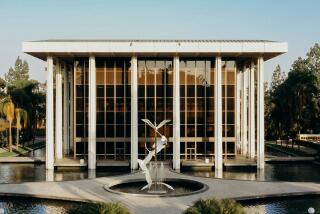ANDRE WATTS OPENS PIANO SERIES
- Share via
At his recital opening the Piano Series in Ambassador Auditorium on Thursday, Andre Watts amply demonstrated how he maintains his secure position in the upper echelon of the concert business. To begin, management must love him for his box-office appeal: As usual the hall, the orchestra pit and half the stage were packed to capacity.
The public seems to loves him because he consistently provides close to a maximum of enjoyment no matter what he plays. He is a versatile pianist, as engaging as a subtle miniaturist as he is as a raging virtuoso, and he never allows his repertory to jell. Watts is invariably eloquent--no mannerisms or personal exploitation is permitted to intrude on the music.
In a way, he made a daring choice in Beethoven’s “Appassionata” Sonata. Once an item of major popularity, the rigorous work has been sidestepped by pianists in recent years. Watts restored its appeal to an extent that the audience cheered the conclusion. He did not seem entirely comfortable in certain passages of the first movement, but the variations became an island of unperturbed serenity, and the cyclonic finale charged with relentless speed and fury. Maybe not quite a definitive interpretation, but nonetheless a powerful one.
The florid figuration of Haydn’s Sonata in C, Hob. XVI:48, was carved with classic clarity. Three “Moments Musicaux” from Schubert’s Opus 94 were delineated with the probing sensitivity of an artful Lied singer.
Watts made a grand display of Rachmaninoff’s formidable Variations, Opus 42, on the “La Folia” theme once attributed to Corelli. The work is a summary of all the Rachmaninoff moods and technical devices, and Watts played it with urgent dramatic involvement, a style of playing again exposed in more Rachmaninoff: two “Moments Musicaux” from Opus 16 and three “Etudes-Tableaux” of Opus 33.
Not in the least fatigued by this strenuous exertion, Watts was persuaded to add two encores: Liszt’s Etude in D-flat (“Un Sospiro”) and the Liszt-Paganini Caprice, “La Chasse.”
More to Read
The biggest entertainment stories
Get our big stories about Hollywood, film, television, music, arts, culture and more right in your inbox as soon as they publish.
You may occasionally receive promotional content from the Los Angeles Times.










